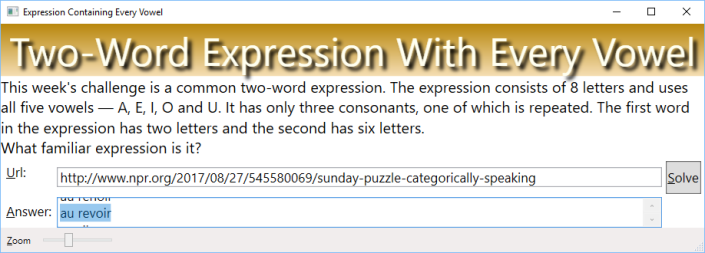Fun With Linq – Solving the Sunday Puzzle
The Challenge
This week’s challenge is a common two-word expression. The expression consists of 8 letters and uses all five vowels — A, E, I, O and U.
It has only three consonants, one of which is repeated. The first word in the expression has two letters and the second has six letters.
Techniques to Solve
- File IO
- Complex dictionaries
- Linq operations, including
- Where
- Aggregate
- Except
- GroupBy
Comments on the Puzzle
That was kind of a tough puzzle! I found some phrase lists on the internet, but they weren’t very big and none of them contained the solution. Out of frustration, I elected to search word lists to construct word pairs that match Will’s description. Even that didn’t work until I get a really big word list that had some French words.
Finally, after plugging in my biggest word list, and manually sifting through 4,403 candidates, I found the answer. While looking at the candidates starting with “au”, something in the back of my mind pulled-up the answer “au revoir” before I actually saw it on screen.
Some Near Misses
I got a kick out of these, which met the rules, but probably aren’t “common expressions”:
- Go, Aussie!
- No Auntie!
- Oi, abuses
- Up roarie
 Overview of The Algorithm
Overview of The Algorithm
- Open the word list, read every word
- Length == 2 ? add to a list named “twoLetterWords”
- Length == 6 ? Store in a dictionary
- The dictionary uses the word’s vowels as a key,
- Such as key = “eio” for the word “revoir”
- For each key, keep a list of all the 6-letter words that contain those vowels
- So the data type for my dictionary is “Dictionary<string, List> sixLetterWordDic”
- So, under the dictionary key “eio”, I store a list of 1,227 words that use those three vowels, including “revoir”
- The dictionary uses the word’s vowels as a key,
- After building the dictionary and the 2-letter word list
- Iterate all the two-letter words
- Compute the vowels not used in the 2-letter word
- Use them as a key to the dictionary
- Loop through the word list stored under key composed of the remaining vowels
- Apply Will’s criteria “3 consonants, one of which is repeated”
- By using the GroupBy operator
Here’s the Code
private void btnSolveFromWordList_Click(object sender, RoutedEventArgs e) {
List<string> twoLetterWords = new List<string>();
//For speed, we look-up words using their vowels as a key
//For example,
// sixLetterWordDic["eio"] = { "belion", "beloid", .... "revoir" }
//To wit, the key "eio" represents all the vowels EXCEPT "au"
// The value is a list of words containing those vowels, 1,227 total, including "revoir"
Dictionary<string, List<string>> sixLetterWordDic = new Dictionary<string, List<string>>();
List<string> vowels = new List<string> { "a", "e", "i", "o", "u" };
//Open the word file and read every line, building the word list and the dictionary
using (StreamReader sr = new StreamReader(File.OpenRead(WORD_File))) {
while (sr.Peek() != -1) {
string aWord = sr.ReadLine().ToLower();
if (aWord.Length == 6) {
//Get all the vowels in the word and concatenate into a string
string vowelKey = vowels.Where(v => aWord.Contains(v))
.Aggregate("", (p, c) => p + c);
if (vowelKey.Length > 0) {
//Add to the dictionary using the vowels as a key; hopefully it does not need sorting
if (sixLetterWordDic.ContainsKey(vowelKey))
sixLetterWordDic[vowelKey].Add(aWord);
else
sixLetterWordDic.Add(vowelKey, new List<string> { aWord });
}
} else if (aWord.Length == 2 && !twoLetterWords.Contains(aWord))
twoLetterWords.Add(aWord);
}
}
//Now that we have the word list and dictionary, loop through seeking
//a solution:
int word2Count = 0;
foreach (string aWord in twoLetterWords) {
//Get just the vowels; for examle, if the word is "of", then foundVowels will be { "o }
List<string> foundVowels = vowels.Where(v => aWord.Contains(v)).ToList();
if (foundVowels.Count > 0) {
//get all the vowels NOT used in foundVowels
string remaining = vowels.Except(foundVowels)
.Aggregate("", (p, c) => p + c);
if (sixLetterWordDic.ContainsKey(remaining)) {
foreach (string partner in sixLetterWordDic[remaining]) {
//We know there should be two distinct consonants, and one of them is repeated
//so use GroupBy on the letters.
var consonantGroups = (aWord + partner)
.Where(l => "aeiou".IndexOf(l) < 0)
.GroupBy(l => l);
if (consonantGroups.Count() == 2 &&
(consonantGroups.First().Count() == 2 || consonantGroups.Last().Count() == 2)) {
txtAnswer.Text += aWord + " " + partner + "\n";
matchCount++;
}
}
}
}
}
}
What’s Up with the Dictionary?
My word list is huge – more than 775,000 entries. That results in 54,596 six letter words and 646 2-letter words. I can’t wait around while my code checks every 2-letter word against that huge list of 6-letter words. So I used a dictionary for speed.
The dictionary has a shorter list for every vowel combination. As I mentioned in my code comments, the key “eio” is linked to a list of 1,227 6-letter words. So when I encounter words like “au”, I don’t need to check all 56,596 6-letter words, I only need to check 1,227. So, for just that sample, it runs 46 times faster.
Explain the Aggregate Operation!
I used the Linq operation ‘Aggregate’ a couple of times, like here:
string vowelKey = vowels.Where(v => aWord.Contains(v)) .Aggregate(“”, (p, c) => p + c);
For example, if aWord = “revoir”, then vowelKey will be assigned “eoi”.
Here’s a step-by-step breakdown of what each clause does:
- “Vowels.Where(v => aWord.Contains(v))” means:
- Loop through my list of vowels
- Build a list of each vowel (string) that meats the Where clause
- Namely, if aWord contains that vowel, add it to that list
- If you want to be picky, it is an IEnumerable<string>, not a “list”
- Take the list we just built and pipe it into an aggregate operation
- “Aggregate(“”, (p, c) => p + c)” means:
- “” – The empty quotes represent the seed.
- We add everything else to the seed
- We could have used something else as a seed, like a hyphen
- In which case the result would have been “-eio”, not “eio”
- (p, c) => p + c – perform this operation on every entry in the list
- p represents the accumulated result so far
- c is the current list entry, i.e. a vowel
- In case you didn’t know, the “+” operator concatenates two strings
- So, on the first pass, p == “” and c == “e”
- Second pass, p == “e” and c == “i”
- Third pass, p == “ei” and c == “o”
- “” – The empty quotes represent the seed.
Summary
Linq operators shorten the code quite a bit. The hashing capabilities of the dictionary make the solution run a lot faster.
Get the Code
Here’s a link to my drop box account to download the code and run it yourself (note that DropBox will require you to set-up a free account to get the code). I didn’t include my word list (too big), but you can download it here.
